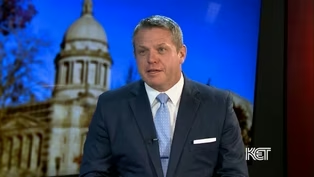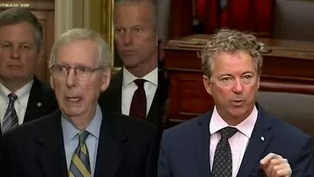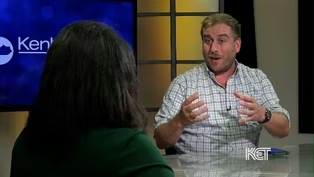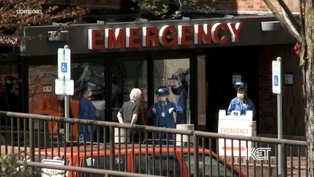
Mobile Healthcare Unit
Clip: Season 2 Episode 80 | 3m 45sVideo has Closed Captions
A new mobile healthcare unit from Stepworks is helping people in rural Kentucky.
A new mobile healthcare unit from Stepworks Recovery Centers is helping people in rural Kentucky.
Problems playing video? | Closed Captioning Feedback
Problems playing video? | Closed Captioning Feedback
Kentucky Edition is a local public television program presented by KET

Mobile Healthcare Unit
Clip: Season 2 Episode 80 | 3m 45sVideo has Closed Captions
A new mobile healthcare unit from Stepworks Recovery Centers is helping people in rural Kentucky.
Problems playing video? | Closed Captioning Feedback
How to Watch Kentucky Edition
Kentucky Edition is available to stream on pbs.org and the free PBS App, available on iPhone, Apple TV, Android TV, Android smartphones, Amazon Fire TV, Amazon Fire Tablet, Roku, Samsung Smart TV, and Vizio.
Providing Support for PBS.org
Learn Moreabout PBS online sponsorshipAnd addiction treatment and sober living community is taking its services on the road.
Step Works has six residential centers across Kentucky.
They are now helping more people in rural communities with a new mobile unit.
Our Laura Rogers takes us inside.
We are able to go ahead and prescribe their medications for them.
Lynn Miller is a medical assistant on board the intensive health mobile Health care unit.
I have the EpiPen in in here.
The van is outfitted with everything needed for basic health care needs.
I have four glucose.
Patients can also get blood work, mental health counseling and addiction recovery care.
Here, I can check their sugar if it might be too high.
We offer every service that we offer in the office so patients can come to the mobile unit and receive primary care.
They can have psych med management.
We offer counseling either over the unit or with our partners.
Duncan says the majority of their patients are homeless.
There are people without access to health care through traditional means.
The mobile unit launched in July, made possible by a $2 million grant from the Health resources and Services Administration.
Having the ability to help people on the street and taking our care to them, that's quite remarkable.
Jonathan Rondeau Is the data coordinator collecting basic information from patients.
And those numbers can help as far as the general population that we see and who we are actually getting care to.
A survey that will provide a closer look at things like food and housing insecurity, demographics which can provide a wider look at community issues.
Taking their blood pressure to their temperature.
A lot of our patients are very excited to have this in their community.
They struggle to find transportation or to to seek services outside of their community.
They're also very encouraged that there are people that can treat their specific illness and their specific disease right here at.
Home on this particular day.
The unit is set up in Glasgow and the parking lot of a mental health clinic, one of the unit's partners, along with area health departments.
Mental health is just as equally important.
And a lot of times it goes hand in hand with addiction.
So we do offer both services to to seek a therapist as well as to seek help for addiction.
The staff tells me their goal is to offer compassionate care while erasing stigma.
So even though we've got more encouraging attitudes towards addiction, people in recovery, people in addiction still feel that.
And one of the main things that we're combating with the mobile unit is eliminating that stigma and encouraging our patients to come out of the shadows.
And more people are doing so as intensive health works to spread the word of their services.
At their busiest, they may see 5 to 6 patients a day.
Like, if I was going to take their temperature, I was.
Telling a patient today he how are things going?
And I said, you know, they're going slow and steady.
We are building that patient workload and trying to help people.
I said, But even if we help one person a day, it is worth having this mobile unit out because sometimes that's one life saved.
The Hearse Grant funds the project for four years.
Joyce Johnson tells me their goal was to be able to sustain their services past that time.
The intensive health mobile unit makes weekly stops in Barron, LaRue, Nelson, Marion and Grayson counties.
For Kentucky Edition, I'm Laura Rogers.
Thank you so much, Laura.
As we've previously reported, the Medicaid program is also expanding services to include mobile crisis intervention teams funded by the American Rescue Plan Act.
According to Kentucky Secretary Eric Friedlander, those new services should be starting in the spring.
Education Commissioner Jason Glass
Video has Closed Captions
Clip: S2 Ep80 | 5m 20s | Ed. Comm. Jason Glass reflects on his time serving in Kentucky and why he's leaving. (5m 20s)
KY Senators On Possible Government Shutdown
Video has Closed Captions
Clip: S2 Ep80 | 2m 44s | KY Senators Mitch McConnell and Rand Paul weigh in on the possible government shutdown. (2m 44s)
Midweek Political Check In With Ryland Barton (9/20/23)
Video has Closed Captions
Clip: S2 Ep80 | 6m 34s | Abortion a key topic in Gov. race and KY Supreme Court considers congressional maps. (6m 34s)
Protecting Butterflies in Kentucky
Video has Closed Captions
Clip: S2 Ep80 | 3m 9s | A new butterfly greenhouse to educate guests on the importance of butterflies. (3m 9s)
Rural Hospital Closure Risks in Kentucky
Video has Closed Captions
Clip: S2 Ep80 | 3m 44s | Almost a quarter of all rural hospitals in Kentucky are at risk of closing. (3m 44s)
Providing Support for PBS.org
Learn Moreabout PBS online sponsorship
- News and Public Affairs

Top journalists deliver compelling original analysis of the hour's headlines.

- News and Public Affairs

FRONTLINE is investigative journalism that questions, explains and changes our world.












Support for PBS provided by:
Kentucky Edition is a local public television program presented by KET




